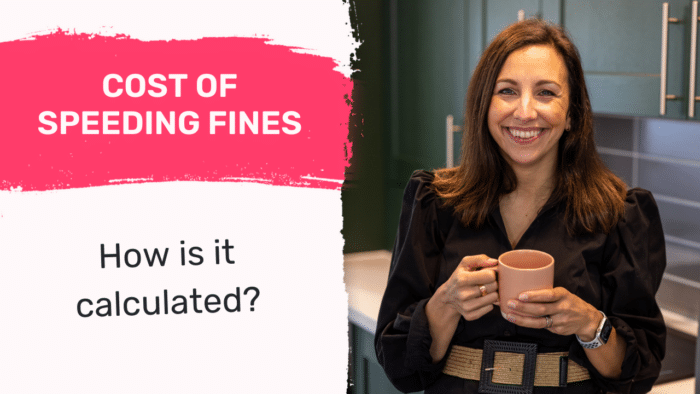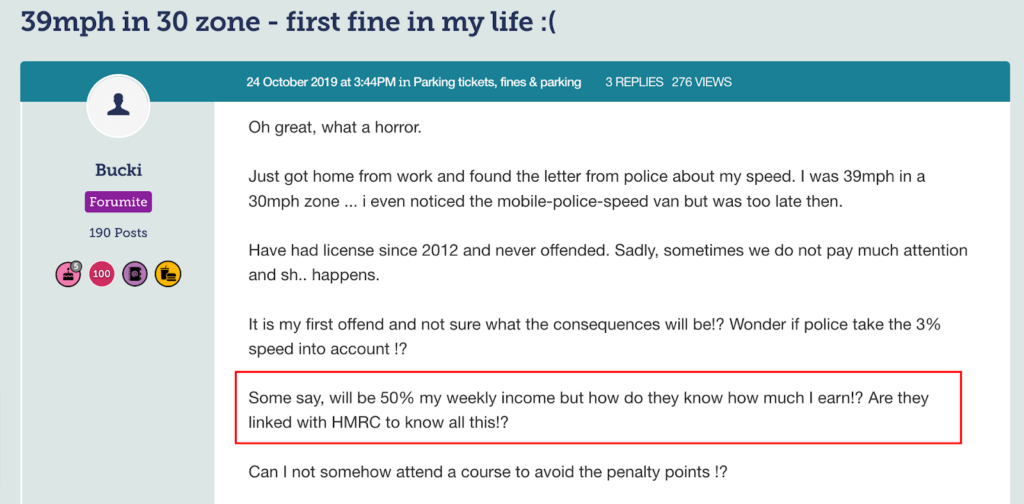How is Weekly Income Calculated for Speeding Fines in the UK?

Have you just received a speeding ticket? You’re not alone. Our site is visited by over 32,000 people every month who are looking for advice on tickets and fines.
It can be a bit confusing and scary, but don’t worry. This article will show you:
- How speeding fines are worked out in the UK
- How your weekly income affects your fine
- What you can do to appeal against your ticket
- The ’14day loophole’ that might help you
- How to avoid getting more tickets in the future
We know how you feel; some of us have been there too. With our expertise, we’ll help you understand what you can do about that speeding fine.
Around 50% of Appeals Succeed
In some circumstances, you might have a legitimate reason not to pay your speeding fine.
It’s a bit sneaky, but the last time I needed legal advice, I paid £5 for a trial to chat with an online solicitor called JustAnswer.
Not only did I save £50 on solicitor fees, I also won my case and didn’t have to pay my £271 fine.
Chat below to get stared with JustAnswer.
*Carwow reports around 50% of appeals are successful, so it’s well worth a try.
How are speeding fines calculated in the UK?
Speeding fines in the UK are calculated based on a percentage of your weekly income, which is determined by how much over the speed limit you were travelling.
First off, the least you can be fined for speeding is £100 and the maximum you can be fined is £1,000 on a normal road and £2,500 on a motorway. These lower and upper limits are imposed no matter how much you earn.
The cost of a speeding fine is best understood with the following table:
| Band | Mph over the speed limit | Percentage of weekly income fined |
| A | 1-9mph | 25% to 75% |
| B | 11-20mph | 75% to 125% |
| C | 21mph + | 125% to 175% |
| D | Speeding + and other factors | 200% to 300% |
| E | Speeding + and other factors | 300% to 500% |
| F | Speeding + and other factors | 500% to 700% |
Bands D, E and F are all the higher bands that are only used when extra factors need to be considered.
These additional factors can vary considerably. For example, you might go up into these bands if you were speeding in a school zone or if the conditions were wet. But you can also be categorised into these bands if you are on bail for a completely different type of offence.
But remember, the maximum fines are always in play, so low-earners will still be fined at least £100 in Band A, and high-earners will never be fined more than £1,000 on a normal road or £2,500 on a motorway.
Where are speeding fines determined by income?
The UK fines people for speeding based on their weekly income, but there are also minimum and maximum fines that are imposed. These limits override the weekly income percentages.
The UK isn’t alone in using income to determine speeding fines. Other countries like Finland also use a similar – although not identical – model.
In Finland, they simply divide the offending driver’s daily salary by two based on the amount over the speed limit, although with no maximum!
This resulted in one speeding ticket for around £50,000 approx!
Successful Appeal Case Study
Situation
| Initial Fine | £100 |
| Additional Fees | £171 |
| Total Fine | £271 |
The Appeal Process
Scott used JustAnswer, online legal service to enhance his appeal. The trial of this cost him just £5.
| Total Fine | £271 |
| Cost of legal advice | £5 |
JustAnswer helped Scott craft the best appeal possible and he was able to win his case.
Scott’s fine was cancelled and he only paid £5 for the legal help.
In partnership with Just Answer.
How is weekly income calculated for speeding fines?
Speeding fines are the most common motoring offence in the UK, so it’s no wonder why so many people ask me lots of interesting questions to do with these fines. Just like this one:

Source: https://forums.moneysavingexpert.com/discussion/6062375/39mph-in-30-zone-first-fine-in-my-life
Your weekly income is the amount you’re paid per week after tax and National Insurance has been deducted. Some state benefits may be included, but most of them aren’t.
For example, if you earned £400 per week and paid £100 in income tax and National Insurance, your weekly income will be considered £300. This is a simplified example only.
What is the 14-day loophole for speeding fines?
The 14-day loophole for speeding fines is a potential way to avoid prosecution for speeding. Consequently, you can’t be issued with a Fixed Penalty Notice either, so you can’t be fined etc either.
When you’re caught speeding, the police must send the registered vehicle owner a Notice of Intended Prosecution (NIP) within 14 days (not including the day of the offence). If the NIP isn’t received within 14 days, you can no longer be prosecuted.
The 14-day loophole for speeding is real, but it’s quite rare that an offending driver can use it to get off the hook. This is because most police forces send the NIP quickly. Although, bank holidays and postal strikes could work in your favour.
You should also know that the vehicle owner doesn’t have to receive a physical Notice of Intended Prosecution in the post. If a police officer has pulled you over at the side of the road, they can give you a verbal NIP instead.
Join thousands of others who got legal help for a £5 trial
Getting the support of a Solicitor can take a huge weight off your mind.
Reviews shown are for JustAnswer.
It’s easier to avoid a parking ticket!
You may have to rely on luck to get out of a speeding ticket, but the same can’t be said for parking tickets. There are lots of good and effective excuses to avoid having to pay a Parking Charge Notice. I discuss these in my How to Appeal a Parking Ticket blog.
What is the relevant weekly income for speeding fines? (Quick recap)
Relevant weekly income for speeding fines is your weekly income after tax and National Insurance have been deducted.
But remember, you’ll always be fined at least £100 and at most £1,000 unless you were driving on a motorway. In this case, the most you can be fined is £2,500.
Did I not answer your related question? Let me know today!
Hire a Parking Solicitor for less than a coffee.

If you’re thinking about appealing your parking ticket then getting some professional advice is a good idea.
Getting the support of a Solicitor can make your appeal much more likely to win.
For a £5 trial, Solicitors from JustAnswer can look at your case and help you create an airtight appeal.
Try it below
In partnership with Just Answer.


